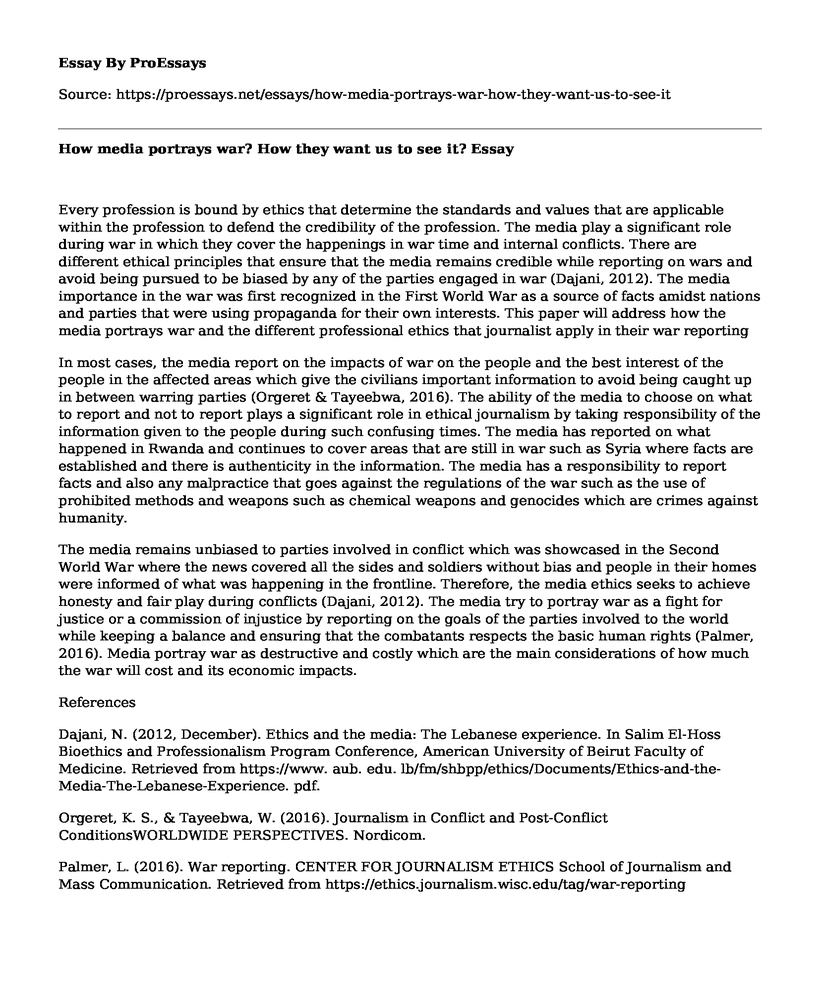Every profession is bound by ethics that determine the standards and values that are applicable within the profession to defend the credibility of the profession. The media play a significant role during war in which they cover the happenings in war time and internal conflicts. There are different ethical principles that ensure that the media remains credible while reporting on wars and avoid being pursued to be biased by any of the parties engaged in war (Dajani, 2012). The media importance in the war was first recognized in the First World War as a source of facts amidst nations and parties that were using propaganda for their own interests. This paper will address how the media portrays war and the different professional ethics that journalist apply in their war reporting
In most cases, the media report on the impacts of war on the people and the best interest of the people in the affected areas which give the civilians important information to avoid being caught up in between warring parties (Orgeret & Tayeebwa, 2016). The ability of the media to choose on what to report and not to report plays a significant role in ethical journalism by taking responsibility of the information given to the people during such confusing times. The media has reported on what happened in Rwanda and continues to cover areas that are still in war such as Syria where facts are established and there is authenticity in the information. The media has a responsibility to report facts and also any malpractice that goes against the regulations of the war such as the use of prohibited methods and weapons such as chemical weapons and genocides which are crimes against humanity.
The media remains unbiased to parties involved in conflict which was showcased in the Second World War where the news covered all the sides and soldiers without bias and people in their homes were informed of what was happening in the frontline. Therefore, the media ethics seeks to achieve honesty and fair play during conflicts (Dajani, 2012). The media try to portray war as a fight for justice or a commission of injustice by reporting on the goals of the parties involved to the world while keeping a balance and ensuring that the combatants respects the basic human rights (Palmer, 2016). Media portray war as destructive and costly which are the main considerations of how much the war will cost and its economic impacts.
References
Dajani, N. (2012, December). Ethics and the media: The Lebanese experience. In Salim El-Hoss Bioethics and Professionalism Program Conference, American University of Beirut Faculty of Medicine. Retrieved from https://www. aub. edu. lb/fm/shbpp/ethics/Documents/Ethics-and-the-Media-The-Lebanese-Experience. pdf.
Orgeret, K. S., & Tayeebwa, W. (2016). Journalism in Conflict and Post-Conflict ConditionsWORLDWIDE PERSPECTIVES. Nordicom.
Palmer, L. (2016). War reporting. CENTER FOR JOURNALISM ETHICS School of Journalism and Mass Communication. Retrieved from https://ethics.journalism.wisc.edu/tag/war-reporting
Cite this page
How media portrays war? How they want us to see it?. (2022, Oct 10). Retrieved from https://proessays.net/essays/how-media-portrays-war-how-they-want-us-to-see-it
If you are the original author of this essay and no longer wish to have it published on the ProEssays website, please click below to request its removal:
- Sales Letter to MediaMix Studios
- The Five Competitive Forces that Shape Strategy
- Public Relation Strategy and How It Builds Reputation? - Paper Example
- Essay Sample on Cybercrimes/Cybersecurity
- Child Witnesses in Criminal Proceedings: Key Considerations for Valid Evidence - Essay Sample
- Essay Sample on Team's Competitive Edge: Product/Service Diff. Strategy
- Essay Example on California Psychological Inventory (CPI) Assessment: Enhancing Performance







